Role of Transformational Leadership in Improving Organizational Culture
Explain the importance of including the ability to understand and conduct business research as a key selection criterion in future job positions.
31 Pages8211 Words1 Views
Added on 2023-01-18
About This Document
This research focuses on the role of transformational leadership in improving the organizational culture of Holiday Inn hotels in Australia. It explores the impact of transformational leadership on organizational culture and its significance in enhancing employee motivation, morale, and retention. The study aims to provide insights into effective leadership practices that can positively influence the organizational culture and contribute to the success of the hospitality industry.
Role of Transformational Leadership in Improving Organizational Culture
Explain the importance of including the ability to understand and conduct business research as a key selection criterion in future job positions.
Added on 2023-01-18
ShareRelated Documents
Business Research Design

Table of Contents
1.0 Introduction..........................................................................................................................1
2.0 Research question and its significance.................................................................................1
3.0 Primary practices..................................................................................................................2
4.0 Literature review..................................................................................................................3
4.1 Concept of transformational leadership and impact on organizational culture................3
4.2 Role of transformational leadership to influence the organizational learning and
innovation...............................................................................................................................5
4.3 Assessing the factors affecting transformational leadership and organizational culture
of Holiday Inn........................................................................................................................7
5.0 Research methodology.........................................................................................................9
5.1 Data collection.................................................................................................................9
5.2 Sampling........................................................................................................................10
5.2.1 Target population....................................................................................................10
5.2.2 Sampling technique.................................................................................................11
5.2.3 Sample size and location.........................................................................................11
5.3 Data analysis..................................................................................................................12
6.0 Estimated findings..............................................................................................................13
7.0 Time and resource structure...............................................................................................14
8.0 References..........................................................................................................................16
9.0 Appendices.........................................................................................................................21
9.1 Questionnaire.................................................................................................................21
1.0 Introduction..........................................................................................................................1
2.0 Research question and its significance.................................................................................1
3.0 Primary practices..................................................................................................................2
4.0 Literature review..................................................................................................................3
4.1 Concept of transformational leadership and impact on organizational culture................3
4.2 Role of transformational leadership to influence the organizational learning and
innovation...............................................................................................................................5
4.3 Assessing the factors affecting transformational leadership and organizational culture
of Holiday Inn........................................................................................................................7
5.0 Research methodology.........................................................................................................9
5.1 Data collection.................................................................................................................9
5.2 Sampling........................................................................................................................10
5.2.1 Target population....................................................................................................10
5.2.2 Sampling technique.................................................................................................11
5.2.3 Sample size and location.........................................................................................11
5.3 Data analysis..................................................................................................................12
6.0 Estimated findings..............................................................................................................13
7.0 Time and resource structure...............................................................................................14
8.0 References..........................................................................................................................16
9.0 Appendices.........................................................................................................................21
9.1 Questionnaire.................................................................................................................21
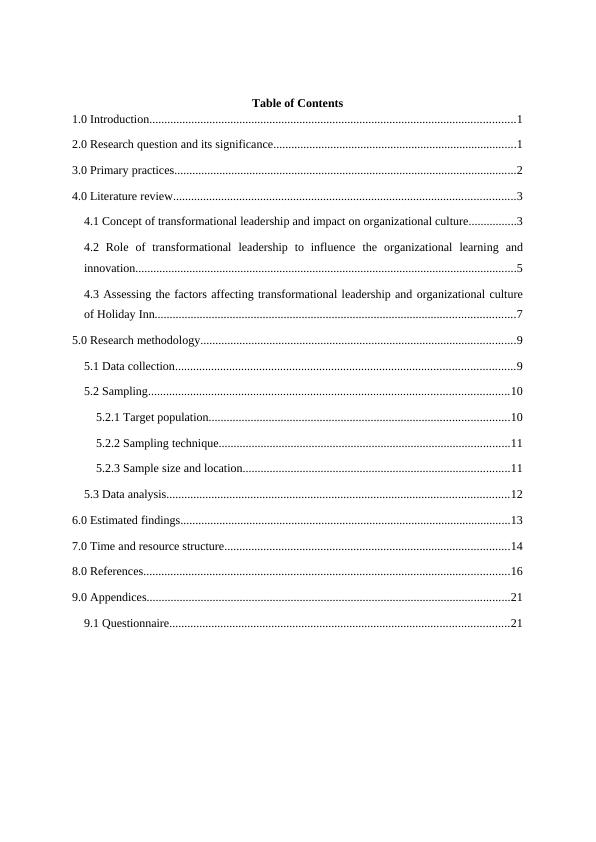
List of figures
Figure 1: Model of organizational learning and transformational leadership............................6
Figure 2: Relationship between transformational leadership and organizational culture..........9
Figure 1:Sampling process.......................................................................................................12
List of tables
Table 1: time structure of proposed research...........................................................................14
Table 2: Organisational culture and leader..............................................................................23
Table 3: Transformational leader and learning........................................................................24
Table 4: difference between primary and secondary data collection methods........................25
Table 5: Differences between probabilistic and non-probabilistic sampling...........................26
Table 6: Resource table............................................................................................................26
Figure 1: Model of organizational learning and transformational leadership............................6
Figure 2: Relationship between transformational leadership and organizational culture..........9
Figure 1:Sampling process.......................................................................................................12
List of tables
Table 1: time structure of proposed research...........................................................................14
Table 2: Organisational culture and leader..............................................................................23
Table 3: Transformational leader and learning........................................................................24
Table 4: difference between primary and secondary data collection methods........................25
Table 5: Differences between probabilistic and non-probabilistic sampling...........................26
Table 6: Resource table............................................................................................................26
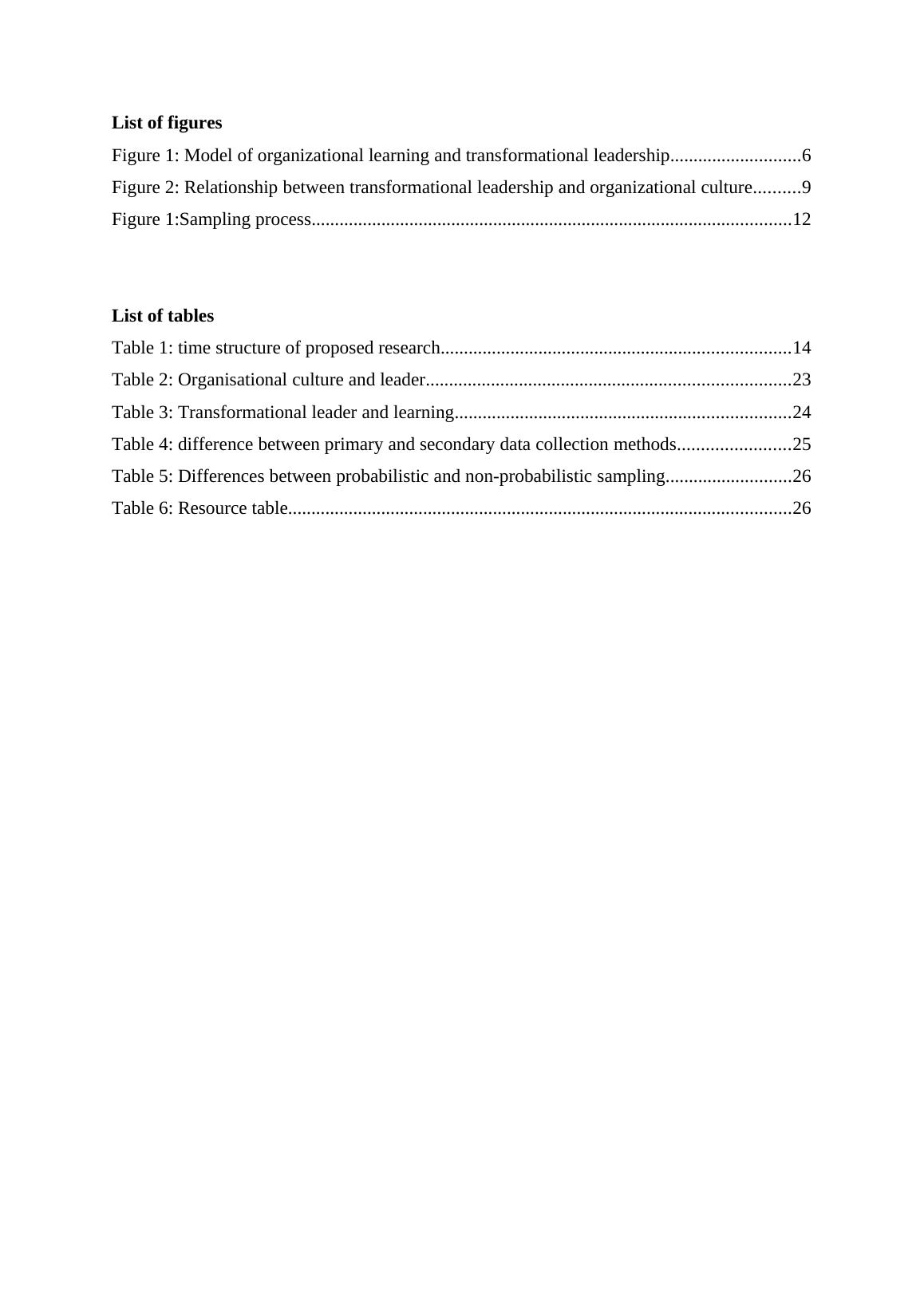
1.0 Introduction
In the current era, changing business environment and high competition forces the
businesses to implement effective practices such as for managing human resources (HR)
which ensure the adequate growth (Dunning, 2014). In this context, the HR management is
influenced by the leadership, reward, culture and structure to a great extent. However, the
hospitality industry is based on the human resources for delivering the high-quality services
to the customers. Further, the satisfaction of customers plays extensive role to determine the
rapid growth. In this regard, the organizational culture shapes the behaviour of individual for
performing the job responsibilities (Awadh and Saad, 2013). It shows that the organizational
culture highly influences the success of hospitality industry. In this context, the current
research will be based on the Holiday Inn hotels in the hospitality industry of Australia.
The purpose of current research plan is to provides the full detailed research which
will be used to improve the organizational culture by implementing effective leadership
practices. It will support the top management to implement the transformational leadership at
the workplace which can positively enhance the effectiveness of organizational culture. It
further motivates the workforce to perform their job responsibility which effectively
contributes in the success of organization (Hartnell and Walumbwa, 2011). On the other
hand, the adequate leadership will support the mangemnt to improve the morale of workforce
which foster their long-term loyalty for the firm. It will provide the sustainable growth to the
firm by reducing the employee turnover.
2.0 Research question and its significance
The present research will be based on “To critically evaluate the role of
transformational leadership in improving the organisational culture. A study on the Holiday
Inn”. The research on this topic is imperative because the culture and leadership plays
extensive role in the growth of the organization. However, the several organizationsface the
failure due to ineffective leadership while same ensure the rapid growth through appropriate
leadership such as Netflix (Awadh and Saad, 2013). The effective leadership provides the
right direction to the followers towards the aim of organization which positively affects the
profitability. Although, the changing business environment forces the business to implement
the transformational leadership which change the workplace culture in the positive manner
(Kovjanic, Schuh and Jonas, 2013). Owing to this, the study to analysing the role of
transformational leadership for improving corporate culture is significant.
Page 1
In the current era, changing business environment and high competition forces the
businesses to implement effective practices such as for managing human resources (HR)
which ensure the adequate growth (Dunning, 2014). In this context, the HR management is
influenced by the leadership, reward, culture and structure to a great extent. However, the
hospitality industry is based on the human resources for delivering the high-quality services
to the customers. Further, the satisfaction of customers plays extensive role to determine the
rapid growth. In this regard, the organizational culture shapes the behaviour of individual for
performing the job responsibilities (Awadh and Saad, 2013). It shows that the organizational
culture highly influences the success of hospitality industry. In this context, the current
research will be based on the Holiday Inn hotels in the hospitality industry of Australia.
The purpose of current research plan is to provides the full detailed research which
will be used to improve the organizational culture by implementing effective leadership
practices. It will support the top management to implement the transformational leadership at
the workplace which can positively enhance the effectiveness of organizational culture. It
further motivates the workforce to perform their job responsibility which effectively
contributes in the success of organization (Hartnell and Walumbwa, 2011). On the other
hand, the adequate leadership will support the mangemnt to improve the morale of workforce
which foster their long-term loyalty for the firm. It will provide the sustainable growth to the
firm by reducing the employee turnover.
2.0 Research question and its significance
The present research will be based on “To critically evaluate the role of
transformational leadership in improving the organisational culture. A study on the Holiday
Inn”. The research on this topic is imperative because the culture and leadership plays
extensive role in the growth of the organization. However, the several organizationsface the
failure due to ineffective leadership while same ensure the rapid growth through appropriate
leadership such as Netflix (Awadh and Saad, 2013). The effective leadership provides the
right direction to the followers towards the aim of organization which positively affects the
profitability. Although, the changing business environment forces the business to implement
the transformational leadership which change the workplace culture in the positive manner
(Kovjanic, Schuh and Jonas, 2013). Owing to this, the study to analysing the role of
transformational leadership for improving corporate culture is significant.
Page 1
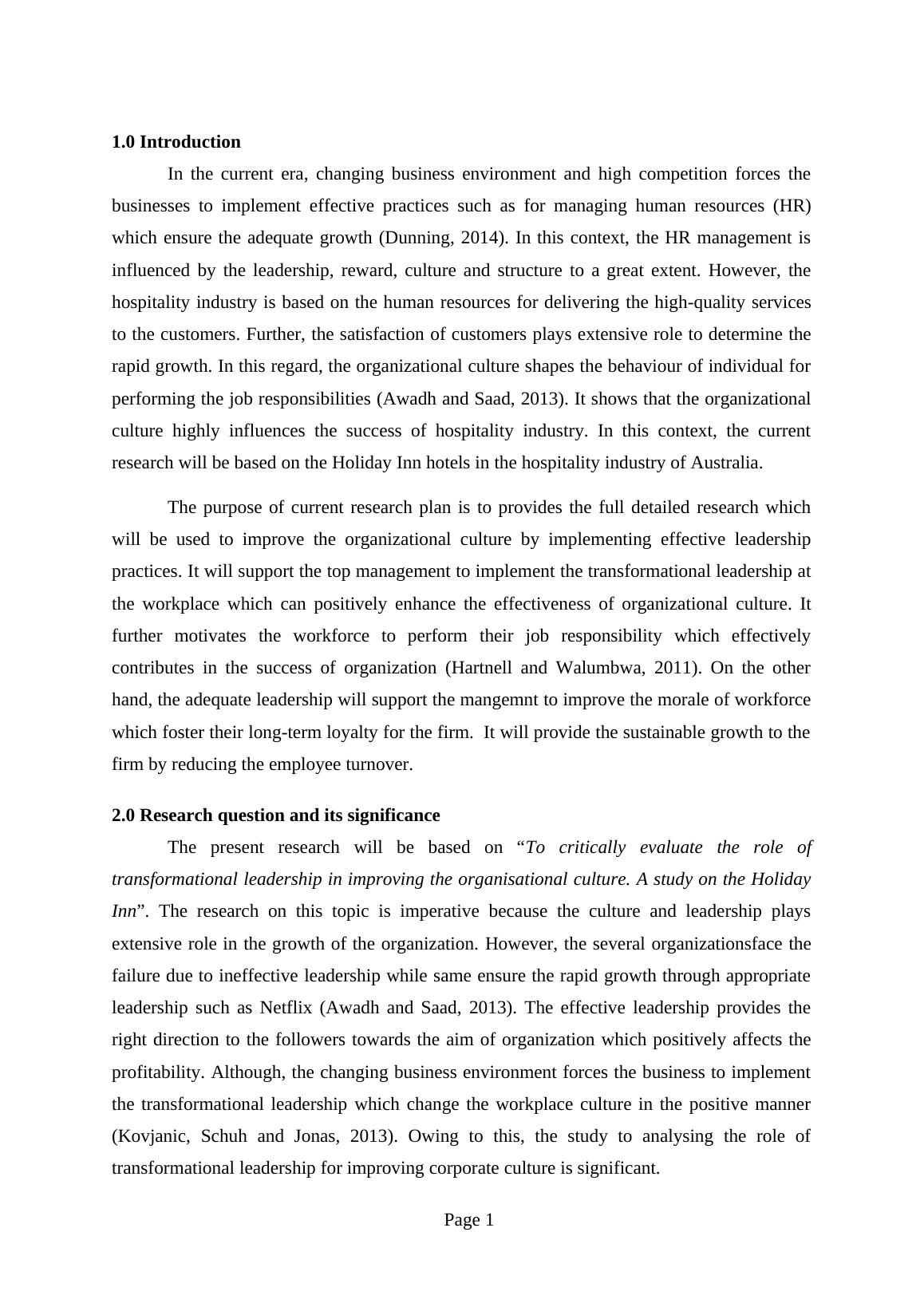
The answer of research question will shed the light on the different aspect of
transformational leader which plays great role for improving organizational culture.
However, the Australian hospitality industry facing the issue of high employees’ turnover
which is critical problem because this industry is dominated by the HR (AI Group, 2018).
Apart from this, the adverse working condition such as long working hours and high work
pressure degrade the morale of workforce for performing their job responsibility effectively
(AlBattat, Som and Helalat, 2014). In this regard, the proposed answer of research question
will support hospitality businesses by implementing the transformational leadership to
improve the corporate culture in the context of employees’ motivation and morale (Awadh
and Saad, 2013). It will support the business to improve the profitability by motivating
workforces through effective organizational culture. Apart from this, it will support the
business to deal with high employees’ turnover and ensure sustainability of the firm. This is
because the employee retention is significant to determine the consistent business operation
without involving frequent recruitment and selection process with routine operations
(Kovjanic, Schuh and Jonas, 2013). It further increases the profitability of the company
because superior performance of employees regulate the effective service delivery and
increase the customers’ loyalty for the firm. The increased loyalty enhances their willingness
to pay for gaining the advantages of high-quality services. Owing to this, the answer of
present research will offer several benefits to the Holiday Inn in terms employees’ retention
and customers’ satisfaction.
3.0 Primary practices
According to Joyce (2005) the success of organization depends upon the four primary
and four secondary practices including strategy, culture, structure, execution (primary),
innovation, leadership, talent, merger and partnership (secondary). The combination of
primary and secondary practices is significant to improve the competitive edge of the firm.
The culture and leadership are closely relevant to research topic because leadership style
shapes the culture of the organization. In this regard, the culture in hospitality business has
extensive role for success by creating the specific environment wherein all operations are
managed and has massive impact on the failure or success (Awadh and Saad, 2013). It
demands to establishe the effective culture wherein the workforce focus on creating value for
their work. However, it is difficult for an organization to sustain high valued culture because
it gets influenced by the several aspects. In this context, the leadership at workplace affects
the values of the corporate culture to great extent (Bolton, Brunnermeier and Veldkamp,
Page 2
transformational leader which plays great role for improving organizational culture.
However, the Australian hospitality industry facing the issue of high employees’ turnover
which is critical problem because this industry is dominated by the HR (AI Group, 2018).
Apart from this, the adverse working condition such as long working hours and high work
pressure degrade the morale of workforce for performing their job responsibility effectively
(AlBattat, Som and Helalat, 2014). In this regard, the proposed answer of research question
will support hospitality businesses by implementing the transformational leadership to
improve the corporate culture in the context of employees’ motivation and morale (Awadh
and Saad, 2013). It will support the business to improve the profitability by motivating
workforces through effective organizational culture. Apart from this, it will support the
business to deal with high employees’ turnover and ensure sustainability of the firm. This is
because the employee retention is significant to determine the consistent business operation
without involving frequent recruitment and selection process with routine operations
(Kovjanic, Schuh and Jonas, 2013). It further increases the profitability of the company
because superior performance of employees regulate the effective service delivery and
increase the customers’ loyalty for the firm. The increased loyalty enhances their willingness
to pay for gaining the advantages of high-quality services. Owing to this, the answer of
present research will offer several benefits to the Holiday Inn in terms employees’ retention
and customers’ satisfaction.
3.0 Primary practices
According to Joyce (2005) the success of organization depends upon the four primary
and four secondary practices including strategy, culture, structure, execution (primary),
innovation, leadership, talent, merger and partnership (secondary). The combination of
primary and secondary practices is significant to improve the competitive edge of the firm.
The culture and leadership are closely relevant to research topic because leadership style
shapes the culture of the organization. In this regard, the culture in hospitality business has
extensive role for success by creating the specific environment wherein all operations are
managed and has massive impact on the failure or success (Awadh and Saad, 2013). It
demands to establishe the effective culture wherein the workforce focus on creating value for
their work. However, it is difficult for an organization to sustain high valued culture because
it gets influenced by the several aspects. In this context, the leadership at workplace affects
the values of the corporate culture to great extent (Bolton, Brunnermeier and Veldkamp,
Page 2
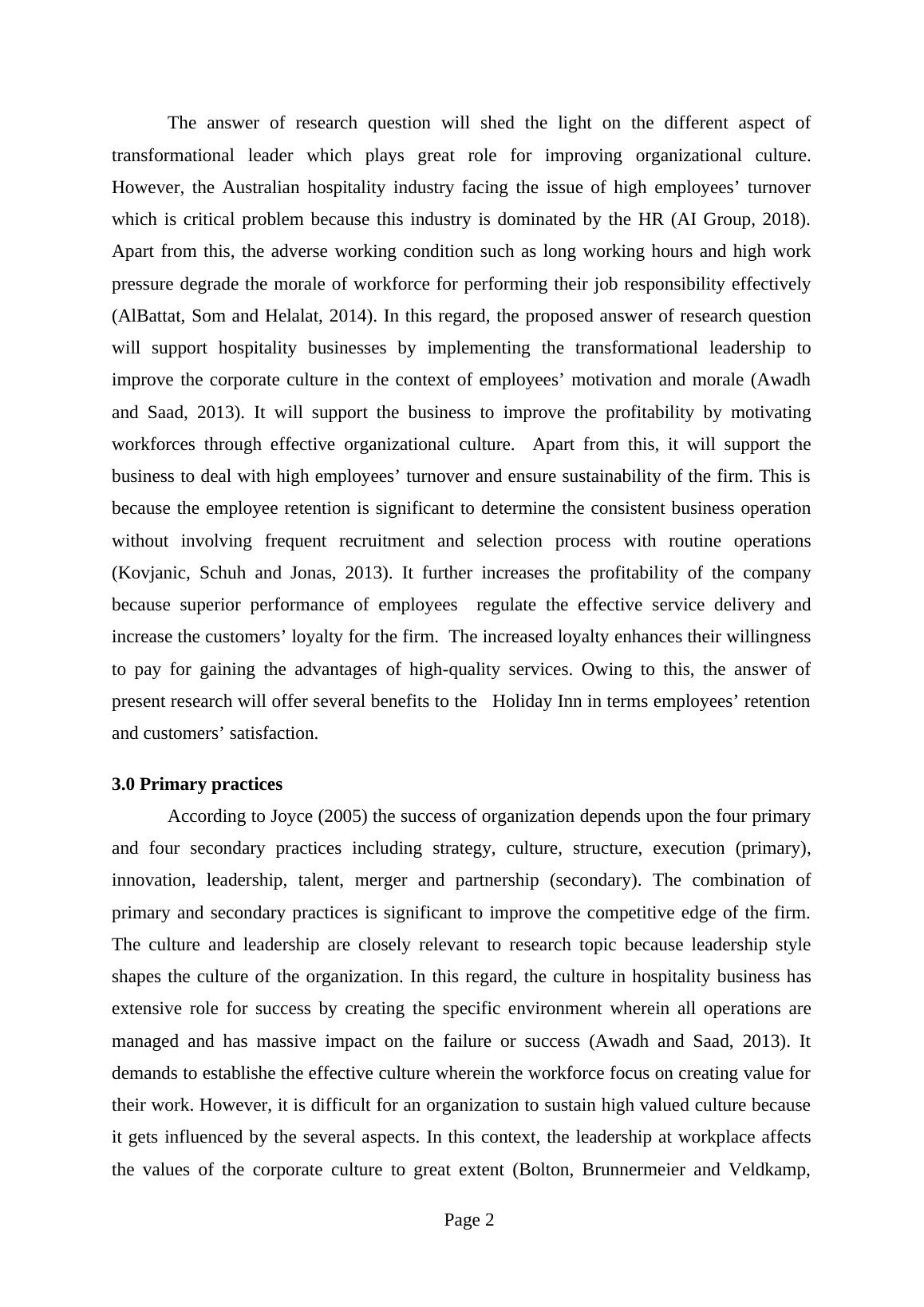
2012). This is because the culture set of shared values which are learned and transmitted in
the organization; however, the behaviour of leaders is firstly absorbed and transmitted at
workplace (Kovjanic, Schuh and Jonas, 2013). The positive behaviour spread the high values
while negative behaviour decreases the morale. It forces the business to focus on effect
leadership for creating valued culture. Owing to this, both primary and secondary practices
are involved in current research.
The proposed research will have positive impact on the culture of Holiday Inn
because the transformational leader brings the several changes at workplace by implementing
different strategies (Hartnell and Walumbwa, 2011). It has positive impact on the corporate
culture because the leader focuses on the motivation of workforce to bring the changes. The
motivating leadership is absorbed by the followers and encourage them to complete the
allocated task effectively (Kovjanic, Schuh and Jonas, 2013). The proposed research will
shed the light on the different perspective of transformational leadership which will affect the
primary practices such as structure, culture and strategy. Apart from this, the current research
will also shed the lights on different leadership theories which will support the firm to use the
appropriate leadership for improving corporate culture. It shows that study on the
transformational leadership for improving the organizational culture will support the Holiday
Inn to improve the existing culture by using effective leadership practices; thus, the proposed
research will have positive impact on firm’s culture.
4.0 Literature review
4.1 Concept of transformational leadership and impact on organizational culture
According to Kark and Shamir (2013), transformational leadership is the managerial
style which is used to influence the employees by focusing on the influencer speech,
intellectual stimulation as well as motivational factors. Moreover, Bushra, Ahmad and
Naveed (2011) asserted that in transformational leadership leaders get inspired by the
atmosphere and trust on the employee’s performance which is beyond the expectations. On
the other hand, Odumeru and Ogbonna (2013) mentioned that transformational leader is a
personality which have a dynamic nature and behavior because the leaders mold the practices
according to the changing environment. However, Riaz and Haider (2010) pointed out that
transformational leadership is based on the compliance of followers which includes the
shifting of beliefs, needs and values of the followers. Further, Ghasabeh, Soosay and Reaiche
(2015) identified that transformational leadership is the unique style of the leaders because it
Page 3
the organization; however, the behaviour of leaders is firstly absorbed and transmitted at
workplace (Kovjanic, Schuh and Jonas, 2013). The positive behaviour spread the high values
while negative behaviour decreases the morale. It forces the business to focus on effect
leadership for creating valued culture. Owing to this, both primary and secondary practices
are involved in current research.
The proposed research will have positive impact on the culture of Holiday Inn
because the transformational leader brings the several changes at workplace by implementing
different strategies (Hartnell and Walumbwa, 2011). It has positive impact on the corporate
culture because the leader focuses on the motivation of workforce to bring the changes. The
motivating leadership is absorbed by the followers and encourage them to complete the
allocated task effectively (Kovjanic, Schuh and Jonas, 2013). The proposed research will
shed the light on the different perspective of transformational leadership which will affect the
primary practices such as structure, culture and strategy. Apart from this, the current research
will also shed the lights on different leadership theories which will support the firm to use the
appropriate leadership for improving corporate culture. It shows that study on the
transformational leadership for improving the organizational culture will support the Holiday
Inn to improve the existing culture by using effective leadership practices; thus, the proposed
research will have positive impact on firm’s culture.
4.0 Literature review
4.1 Concept of transformational leadership and impact on organizational culture
According to Kark and Shamir (2013), transformational leadership is the managerial
style which is used to influence the employees by focusing on the influencer speech,
intellectual stimulation as well as motivational factors. Moreover, Bushra, Ahmad and
Naveed (2011) asserted that in transformational leadership leaders get inspired by the
atmosphere and trust on the employee’s performance which is beyond the expectations. On
the other hand, Odumeru and Ogbonna (2013) mentioned that transformational leader is a
personality which have a dynamic nature and behavior because the leaders mold the practices
according to the changing environment. However, Riaz and Haider (2010) pointed out that
transformational leadership is based on the compliance of followers which includes the
shifting of beliefs, needs and values of the followers. Further, Ghasabeh, Soosay and Reaiche
(2015) identified that transformational leadership is the unique style of the leaders because it
Page 3
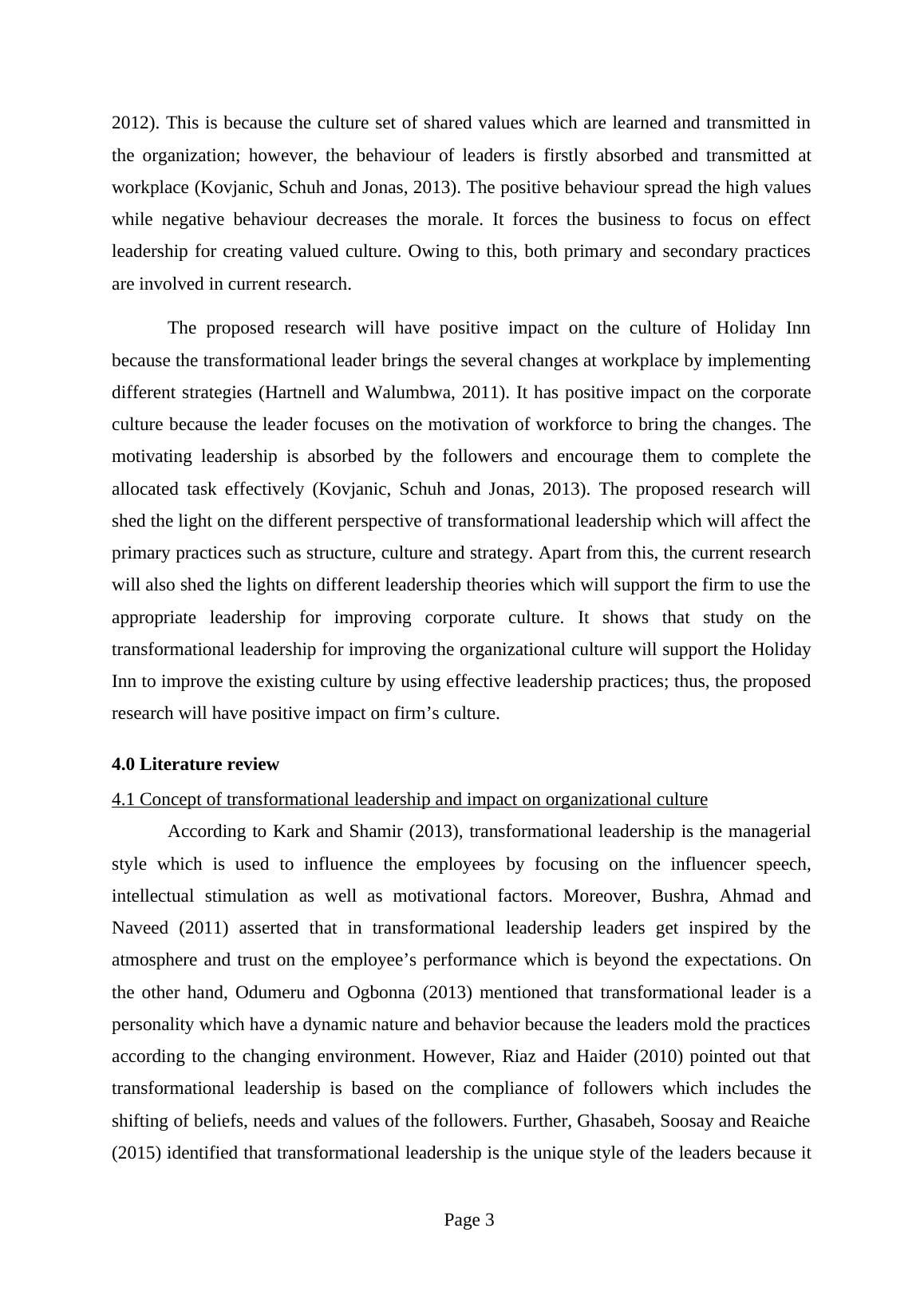
is specially associated with the supportive leadership, inspirational communication,
engagement in all kind of activities of the organization etc. Apart from this, Odumeru and
Ogbonna (2013) notified that transformational leader have a caliber to perform the task as per
the changed requirements and encourage the others to work more enthusiastically to achieve
the targets. Therefore, it shows that transformational leadership is a different practice of the
leader which is helpful to work in any kind of completive environment. Furthermore,
transformational leaders always keen towards the supportive work and focuses on the
performance in the changing environment.
Hoon Song, Kolb, Hee Lee and Kyoung Kim (2012) stated that leadership behavior
always affects the organizational culture and knowledge management in the organization. In
this context, Birasnav (2014) asserted that transformational leadership is based on the
knowledge sharing practices which helps to create an adaptive culture in the organization.
Further, Riaz and Haider (2010) pointed out that transformational leadership is important for
the management of the organizational culture because it creates an innovative cultural
environment wherein leaders focuses on the development of new insights. However, Pieterse,
Van Knippenberg, Schippers and Stam (2010) argued that transformational leaders are
beneficial for the organizations because leaders emphasize on new learning, innovations and
developments in the organization which further improves the culture of the internal
environment. Besides this, Kelloway, Turner, Barling and Loughlin (2012) found that
transformational leadership style has significant importance because the leaders are closely
associated with the followers working conditions like involvement, influence, adaptiveness
etc. Additionally, involvement in transformational leadership is associated with the job-
satisfaction and meaningfulness is related to well-being of the employees. Hence, it shows
that transformational leadership is important for the organizations culture because it focuses
on the involvement of new insights in the firm. Moreover, it helps to influence the employees
towards the innovative culture and nature of adaptiveness for the development.
Paarlberg and Lavigna (2010) mentioned that transformational leadership plays a
critical role in the developing a learning culture and climate within the firm and further
empowers the employees for the achievement of the organizational goals. However, Pieterse
et al., (2010) argued that transformational leadership creates the chances of employees burn
out because transformational leaders always focuses on the new plans, organizational change
and development. Additionally, it might be a drawback for the organizations because in
which employees feels like they are taken advantage of more involvement as well as obliged
Page 4
engagement in all kind of activities of the organization etc. Apart from this, Odumeru and
Ogbonna (2013) notified that transformational leader have a caliber to perform the task as per
the changed requirements and encourage the others to work more enthusiastically to achieve
the targets. Therefore, it shows that transformational leadership is a different practice of the
leader which is helpful to work in any kind of completive environment. Furthermore,
transformational leaders always keen towards the supportive work and focuses on the
performance in the changing environment.
Hoon Song, Kolb, Hee Lee and Kyoung Kim (2012) stated that leadership behavior
always affects the organizational culture and knowledge management in the organization. In
this context, Birasnav (2014) asserted that transformational leadership is based on the
knowledge sharing practices which helps to create an adaptive culture in the organization.
Further, Riaz and Haider (2010) pointed out that transformational leadership is important for
the management of the organizational culture because it creates an innovative cultural
environment wherein leaders focuses on the development of new insights. However, Pieterse,
Van Knippenberg, Schippers and Stam (2010) argued that transformational leaders are
beneficial for the organizations because leaders emphasize on new learning, innovations and
developments in the organization which further improves the culture of the internal
environment. Besides this, Kelloway, Turner, Barling and Loughlin (2012) found that
transformational leadership style has significant importance because the leaders are closely
associated with the followers working conditions like involvement, influence, adaptiveness
etc. Additionally, involvement in transformational leadership is associated with the job-
satisfaction and meaningfulness is related to well-being of the employees. Hence, it shows
that transformational leadership is important for the organizations culture because it focuses
on the involvement of new insights in the firm. Moreover, it helps to influence the employees
towards the innovative culture and nature of adaptiveness for the development.
Paarlberg and Lavigna (2010) mentioned that transformational leadership plays a
critical role in the developing a learning culture and climate within the firm and further
empowers the employees for the achievement of the organizational goals. However, Pieterse
et al., (2010) argued that transformational leadership creates the chances of employees burn
out because transformational leaders always focuses on the new plans, organizational change
and development. Additionally, it might be a drawback for the organizations because in
which employees feels like they are taken advantage of more involvement as well as obliged
Page 4
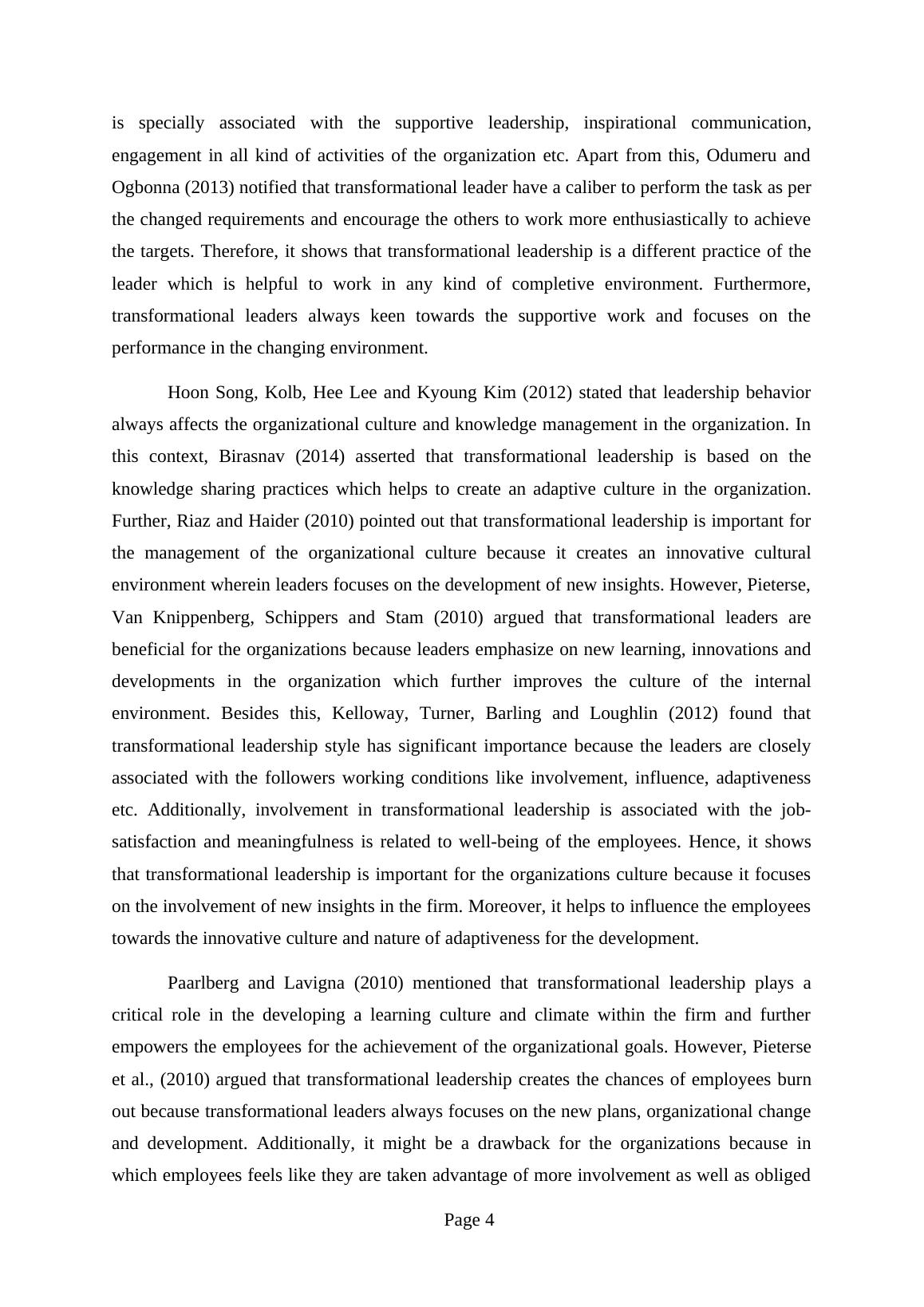
to beyond the task to be achieved. On the contrary, Grant (2012) examined that
transformational leaders are advantages for the organizations culture because leaders
motivate and encourage the employees to a great extent to come out with optimum results.
Apart from this, transformational leaders are more appropriate for the culture of large
organizations because the leaders always focus on the changes in the external environment
and emphasize on the effective changes in the organization as per the external changes. Thus,
it indicates that transformational leadership has own significance towards the culture of the
organization because it changes the overall internal environment on the basis of the changes
in the external environment. Moreover, it creates a collaborative relationship with changes
and cultural environment.
4.2 Role of transformational leadership to influence the organizational learning and
innovation
4.2.1 Transformational leadership and organizational learning
According to Noruzy et al., (2013), transformational leadership plays critical role in
the organization because it modifies the entire cultural environment of the organizations. In
this context, Choudhary, Akhtar and Zaheer (2013) asserted that transformational leadership
and organizational learning has a significant relationship because learning is associated with
the inclusion of new aspects in the procedure or working criteria. However, Kurland, Peretz
and Hertz-Lazarowitz (2010) argued that inability to learn affects the organizational learning
because it is based on the cognitive and behavioral changes. At this juncture, Camps and
Rodríguez (2011) identified that organizational learning is fuels by the transformational
leadership because it focuses on the promoting intellectual stimulation, self-confidence in the
staff members and rendering the inspirational motivation. In this context, Noruzy et al.,
(2013) notified that transformational leadership is directly associated with organizational
learning and knowledge sharing capabilities which further leads to organizational innovations
(Refer the figure 1). Here, Birasnav (2014) delineated that organizational learning has a
positive impact on the organizational performance because workforce focuses on the grasping
of new theories for the overall development. Therefore, it reflects the transformational
leadership and organizational learning are closely associated because leadership has drastic
impact on the learning of the related personnel.
Page 5
transformational leaders are advantages for the organizations culture because leaders
motivate and encourage the employees to a great extent to come out with optimum results.
Apart from this, transformational leaders are more appropriate for the culture of large
organizations because the leaders always focus on the changes in the external environment
and emphasize on the effective changes in the organization as per the external changes. Thus,
it indicates that transformational leadership has own significance towards the culture of the
organization because it changes the overall internal environment on the basis of the changes
in the external environment. Moreover, it creates a collaborative relationship with changes
and cultural environment.
4.2 Role of transformational leadership to influence the organizational learning and
innovation
4.2.1 Transformational leadership and organizational learning
According to Noruzy et al., (2013), transformational leadership plays critical role in
the organization because it modifies the entire cultural environment of the organizations. In
this context, Choudhary, Akhtar and Zaheer (2013) asserted that transformational leadership
and organizational learning has a significant relationship because learning is associated with
the inclusion of new aspects in the procedure or working criteria. However, Kurland, Peretz
and Hertz-Lazarowitz (2010) argued that inability to learn affects the organizational learning
because it is based on the cognitive and behavioral changes. At this juncture, Camps and
Rodríguez (2011) identified that organizational learning is fuels by the transformational
leadership because it focuses on the promoting intellectual stimulation, self-confidence in the
staff members and rendering the inspirational motivation. In this context, Noruzy et al.,
(2013) notified that transformational leadership is directly associated with organizational
learning and knowledge sharing capabilities which further leads to organizational innovations
(Refer the figure 1). Here, Birasnav (2014) delineated that organizational learning has a
positive impact on the organizational performance because workforce focuses on the grasping
of new theories for the overall development. Therefore, it reflects the transformational
leadership and organizational learning are closely associated because leadership has drastic
impact on the learning of the related personnel.
Page 5
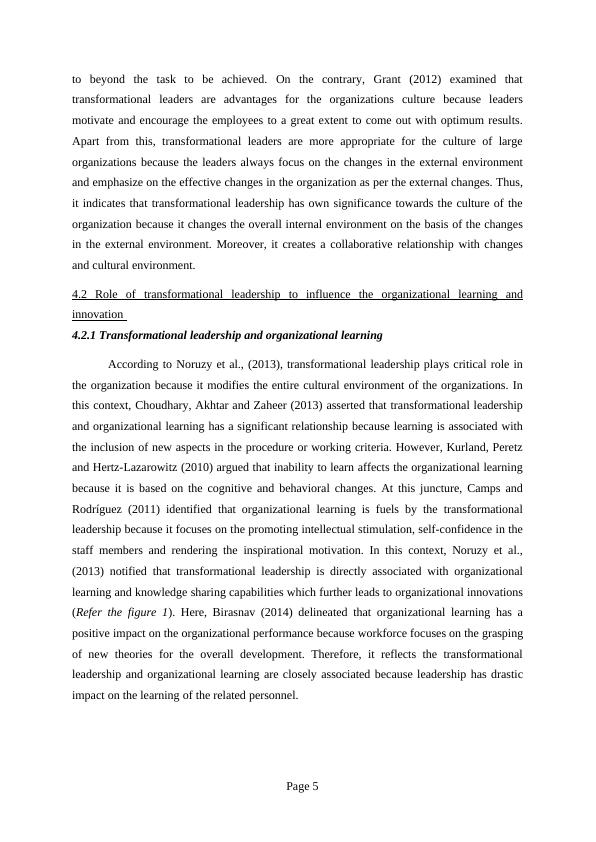
End of preview
Want to access all the pages? Upload your documents or become a member.
Related Documents
Managing Organizations and Leading Peoplelg...
|53
|9153
|72
Improving Safety Awareness in Offshore Environments: A Quantitative and Qualitative Reportlg...
|39
|9413
|440
Management Department of Nursing Collegelg...
|29
|6033
|12
Relationship between Leadership Styles and Patient Safetylg...
|6
|1662
|209
International Business - Assignmentlg...
|15
|1776
|38
Developing an Effective Talent Management System for Managers at Bank of the Bahamaslg...
|85
|19988
|484
